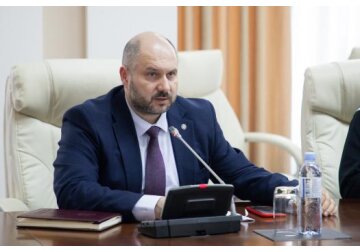
Moldova to announce in Q3 2023 the first tender for the construction of large capacities for energy production from renewable sources.
Minister of Energy Victor Parlicov said this, noting that the matter concerns the tenders for the construction of power plants of high capacity, 165 MW in total: 105 MW allocated for wind power and 60 MW for solar energy. According to him, the launch of these tenders will be possible after the relevant amendments to the Law on the promotion of energy from renewable sources, which were discussed during the public consultations. The mentioned capacities were allocated by a government decision, and it is planned to put these new large capacities into operation by 2025. The amendments to the Law on the promotion of the use of energy from renewable sources were discussed with representatives of ANRE, business associations, renewable energy producers, distribution and transmission system operators, the central electricity supplier, academia and other interested parties. The comments and suggestions received during the consultations will be analyzed and, if necessary, included in the final document. The purpose of the draft law is to create a legal framework to promote the use of energy from renewable sources and to establish national targets for the share of energy from renewable sources in the final gross energy consumption. The law introduces the concept of "independent consumer," which is defined as a consumer who produces electricity from renewable sources for his or her own consumption, which can be stored or sold. The currently applied mechanism of "net metering" (maximum 200 kW) is planned to be applied until December 31, 2026, after which it will be replaced by the mechanism of "net invoicing", that is, the energy supplied and therefore consumed from the grid will be paid monthly by producer and distributor, and not just calculated and paid the difference, as in the case of "net metering". This change will motivate producers not to install power plants of excessive capacity relative to the needs and own consumption, and will also create prerequisites for reliable and fair application of the mechanism in the power system, as well as stimulate the electrification of other sectors of the economy, such as heating/cooling. At the same time, the bill extends guarantees of origin for locally produced renewable energy not only to electricity, but also to gases/biogas, including hydrogen, as well as renewable energy used for heating and cooling. A new element is the possibility to trade guarantees of origin on market terms. Another concept proposed by the law is "renewable energy communities," which would be entitled to produce, co-consume within the community renewable energy produced by their own production units, as well as store and sell that energy. The document proposes new targets for the share of renewable energy in transportation, which would increase annually by an average of 1.3% to 9% in 2030. In the EU, this figure would be 14%. The draft law contains provisions on producers entitled to a fixed tariff and the methodology of its establishment, and provides for the creation of balancing groups of the central supplier. The document also provides for simplification of authorization procedures and strengthening the function of the central supplier, especially with regard to billing, settlements and making payments under the support scheme, and some adjustments are inspired by best practices in supporting the industry, positively exceeding the minimum set of rules and regulations established by industry directives. // 02.05.2023 – InfoMarket







